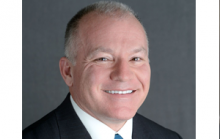
Craig Richardville joined Carolinas HealthCare System (CHS) as CIO nearly two decades ago, and today holds the title of SVP and chief information and analytics officer — a title that he says is indicative of the transformation that IT has undergone.
Richardville was recently honored as the Leadership CIO of the Year from the Charlotte CIO Leadership Association. We asked him to share his insights on how the healthcare industry and the CIO role have changed, and for advice for IT leaders aspiring to one day become CIO.
The Enterprisers Project (TEP): How has managing IT changed since you started at CHS?

Craig Richardville: IT was very operational-oriented and focused on single, individual problems — trying to help make some of the manual processes automated to achieve efficiencies. It was very tactical in nature.
As the industry evolved and started to mature, it’s become more about producing data. Data has become more of a strategic asset. Now, we’ve converted into more of a roadmap. As part of our future, we’ve transitioned into a digital industry that does healthcare. As we engage with our patients, customers, and providers, there are new tools and techniques that are available today that weren’t available several years ago, let alone a couple of decades ago.
We’ve moved from being very tactical, equipment-oriented to very business-minded and savvy, and looking at technology as investments and strategic assets that help us achieve our mission.
TEP: When it comes to leadership, what’s different? What do you focus on now?
Richardville: You have to be a business leader, you have to be business-minded, and you have to focus on the goals and objectives of the business. You also have to look at your toolkit and think about how it helps the company achieve those goals and objectives.
That’s quite different from years ago when CIOs were considered a subject-matter expert with a very particular toolkit. Now CIOs are developing some of the roadmaps, and they’re engaged with a lot of the development of our strategies and how we plan to compete and collaborate in our markets.
You also have to be able to work in teams; since you’re no longer just a subject-matter expert, you need a lot of broad knowledge and to work within the white spaces of the company. You’re not confined to the traditional top-down org chart; you go horizontally, too.
In my opinion, there are two key resources that we bring to the business. One is human resources, which spans every department, division, or company we have. The other is information analytic services, which every department, division, and company also has. The third in the trifecta is the process component – how you bring the people and the technology together.
That’s about engaging with the patients, consumers, and providers so they have the opportunity to use the process that we’re putting together, ensure that it’s attractive to them, and help them to achieve their individual needs. You’ve got to look at solving problems — you’re part of the strategic direction of the company, you’re problem solvers, and you’re sitting at the table and integrating with the boards and community associations. You’re part of the delivery.
TEP: What’s your advice for IT leaders who want to move into the CIO role?
Richardville: You need to be a good learner and listener: Learn, listen, and understand the business — the challenges of the business and the opportunities that the business is presenting you.
You need to be able to work well within teams. There shouldn’t be one superman on your team, and you should never consider yourself one, either. Consider yourself one team, and you’re going to win together.
And then you need to grow talent. That’s one of the biggest gifts you can give back to the organization because you’re taking good experience, a good track record, and good work, and teaching others to do the same. That has a big impact throughout the organization.
I also think it’s important to adopt the philosophy of being a student for life. The way I do that is through mentoring. It’s a privilege to share insights, and it’s a privilege to continue to learn through them. They see, hear, and interpret things differently than me, which helps me to see other people’s viewpoints and sometimes change mine.
TEP: What excites you about the future of healthcare and technology?
Richardville: The CIO role is always evolving. As we progress through this digital revolution, it’s becoming more important to have someone in that role and have their responsibilities evolve, too.
When you look at how we plan on interacting with customers, it’s all changing. Millennials want a completely different experience than what we’ve offered in the past. We need to manage the legacy aspects of that, learn from that, and continue to evolve because that’s something that crosses a couple generations of people.
One of the exciting things for me about healthcare and technology is that these two industries are constantly changing and being disrupted. We’re trying to take some of these disruptions and apply them to our business. For example, we’re writing skills for Amazon’s Alexa. If you need to go to an urgent care center, you can just ask Alexa where the next closest one is, and it will reply with the wait time, directions, and tell you whether there may be traffic.
Those experiences are things that you need to stay on top of to move yourself to the top of the industry. That’s what excites me about it all.






